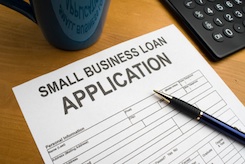Be prepared to apply for a small business loan by using this checklist.
When pursuing a loan for the start-up or growth of your small business, you should first do some research on the types of financing and various lending sources available to you. Armed with this knowledge, you’re now prepared to secure financing for your business, right? Well, not quite. Whether you’ll be seeking a loan through a big financial institution or from your uncle, there are some documents and additional research you’ll need to gather first.
Personal background
When applying for a loan, you’ll likely need to provide some background information about yourself, such as your education, previous names and addresses or even your credit report.
Resume
If you think that working for yourself means ditching your resume, think again! Some lenders may ask for an updated resume as evidence of your business or management experience.
Business plan
When applying for a loan, any lender is going to want to know what your business is about, how you plan to market it and make it profitable and why you need a loan. Your plan should include projected financial statements such as a profit and loss (P&L), cash flow and balance sheet. Click here for resources that can help you put your business plan together.
Income tax returns and bank statements
Most lenders will want to see your income and business (if available) income tax returns for the past three years. You may also be asked to provide your personal and business bank statements for the past year.
Collateral
Most lenders will require some type of collateral against any loan they provide to you—whether it is personal or business collateral. Be ready for this possibility by preparing a document that describes the value of any personal or business collateral you plan to use to secure the loan.
Legal documents
You may be required to present to potential lenders any legal documents pertaining to your business. Gather the following, when applicable:
- Business licenses and registrations
- Articles of Incorporation
- Copies of any contracts you have with outside parties pertaining to your business
- Franchise agreements
- Commercial leases (word for word)
Related Articles:
- How To Get A Small Business Loan
- Alternate Sources of Funding for Your Small Business
- How To Establish A Business Network
- Employment Networking Explained
 Print
Print Email
Email









